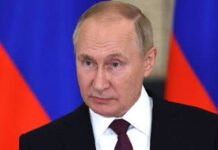Moscow—In a significant escalation of tensions, the Kremlin has unequivocally dismissed Ukrainian President Volodymyr Zelensky‘s proposed peace plan as “nonsense,” a move that not only highlights the deepening rift between Russia and Ukraine but also serves as a substantial setback for the United States. The rejection underscores the entrenched positions of both nations in a conflict that has already endured for over two and a half years, with no clear resolution in sight.
Zelensky’s Peace Plan: A Proposal Met with Dismissal
President Zelensky, facing a war that has devastated Ukraine since February 2022, had articulated a peace plan intended to bring an end to the ongoing conflict. This plan, which Zelensky was poised to discuss with key figures in Washington, including President Joe Biden, Vice President Kamala Harris, and former President Donald Trump, has been summarily dismissed by Russian President Vladimir Putin. The Kremlin’s response was swift and dismissive, labeling Zelensky’s proposal as “nonsense,” signaling Russia’s unwavering commitment to its “special military operation” in Ukraine.
Putin’s rejection of Zelensky’s plan is not merely a diplomatic snub but a clear indication that Moscow sees no value in negotiating under the terms proposed by Ukraine. This stance is emblematic of Russia’s broader strategic goals, which appear to be focused on achieving a decisive military victory rather than engaging in peace talks that might require concessions.
A Setback for U.S. Diplomatic Efforts
The Kremlin’s outright rejection of Zelensky’s plan is a blow to U.S. diplomatic efforts, which have been aimed at finding a peaceful resolution to the conflict. The United States, a key ally of Ukraine, has invested significant political capital in supporting Zelensky and his government. Washington’s strategy has involved a combination of military aid, economic sanctions against Russia, and diplomatic efforts to rally international support for Ukraine’s sovereignty.
However, Russia’s dismissive response to Zelensky’s plan underscores the limitations of these efforts. The refusal to even consider the proposal suggests that Moscow is confident in its current military and geopolitical position, and is unwilling to entertain any peace plan that does not align with its objectives. This development is likely to deepen the sense of frustration within the Biden administration, which has been striving to contain the conflict while avoiding a direct military confrontation with Russia.
Russia’s Determination to Continue the Conflict
President Putin’s remarks make it abundantly clear that Russia is not only uninterested in Zelensky’s peace plan but is also resolved to continue its military campaign in Ukraine. “We are continuing our special military operation and will achieve all our goals,” Putin declared, reaffirming Russia’s commitment to its current course of action.
This statement reflects a broader strategy that has been evident since the early days of the conflict. Russia’s goals in Ukraine appear to be focused on territorial gains, particularly in the eastern regions, and on weakening the Ukrainian state to a point where it can no longer pose a threat to Russian interests. The rejection of Zelensky’s plan suggests that Moscow believes these goals are achievable through continued military action rather than through negotiation.
The Prolonged Stalemate: A Conflict with No End in Sight
The ongoing conflict between Russia and Ukraine has reached a point where both sides seem locked in a protracted stalemate. Despite the heavy losses suffered by both countries, neither side appears willing to compromise. Ukraine, under Zelensky’s leadership, is determined to defend its sovereignty and territorial integrity, while Russia is equally determined to secure its strategic interests in the region.
This deadlock has significant implications for the broader international community. The war has already had a profound impact on global energy markets, food supplies, and geopolitical stability. As the conflict drags on, the prospects for a peaceful resolution seem increasingly remote. The rejection of Zelensky’s plan by Russia only serves to reinforce the notion that this war could continue for many more months, if not years.
The Global Impact of the Russia-Ukraine Conflict
The refusal of Russia to entertain Zelensky’s peace plan is not just a setback for Ukraine and its allies but has far-reaching consequences for the entire world. The conflict has already disrupted global supply chains, leading to soaring energy prices and food shortages in many parts of the world. Countries that rely on Ukrainian grain and Russian energy exports have been particularly hard hit, with developing nations bearing the brunt of these disruptions.
Moreover, the war has intensified the polarization of global politics. The conflict has driven a wedge between Russia and the West, with NATO countries rallying around Ukraine while Russia deepens its ties with other adversaries of the West, such as China and Iran. This realignment of global alliances is likely to have long-term consequences for international relations, with the potential to reshape the global order in ways that are difficult to predict.
America’s Strategic Dilemma: How to Respond?
For the United States, the rejection of Zelensky’s peace plan by Russia presents a significant strategic dilemma. On one hand, Washington is committed to supporting Ukraine in its fight against Russian aggression. On the other hand, the U.S. must carefully navigate its involvement to avoid escalating the conflict into a broader war that could draw in other NATO members.
The Biden administration faces a delicate balancing act. It must continue to provide military and economic support to Ukraine while also pursuing diplomatic efforts to prevent the conflict from spiraling out of control. At the same time, the U.S. must manage its relations with other global powers, particularly China, which has been watching the conflict closely and could seek to exploit any perceived weakness in U.S. resolve.
A War Far from Over
The dismissal of Zelensky’s peace plan by Russia marks another chapter in the ongoing Russia-Ukraine conflict, a war that shows no signs of abating. As both sides dig in their heels, the prospects for a negotiated settlement appear increasingly bleak. For Ukraine, the path forward will require continued resilience and determination, even as it faces the grim reality of a protracted conflict. For Russia, the rejection of peace talks is a calculated move that reflects its broader strategic objectives.
As the world watches, the impact of this conflict will continue to reverberate across the globe, affecting everything from energy prices to international alliances. The United States, caught in the middle of this geopolitical struggle, must now reassess its strategy and prepare for the long haul. The war in Ukraine is far from over, and its outcome will have profound implications for the future of global order.
















